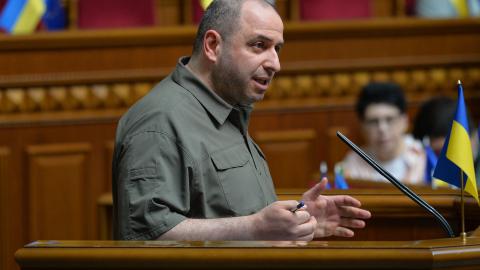Ukraine’s parliament last week confirmed the appointment of Rustem Umerov as Minister of Defense. He replaces Oleksii Reznikov, who had been in office since November 2021 and was credited for persuading Europe and the US to provide billions of dollars in military aid to help Ukraine after Russia’s invasion last year.
Despite that, President Volodymyr Zelensky said that after more than 18 months of war the ministry needed “new approaches and other formats of interaction with both the military and society as a whole.” For Zelensky at least, Umerov is the answer. The appointment sends three important messages to the international community.
First, it shows that Zelensky continues to be a robust and confident leader willing to act in the best interests of his country. Umerov is a member of an opposition political party. Zelensky could have easily appointed a new defense minister from his own party. Instead, he put the national interest first and selected the best person for the job, despite any political differences.
Second, the dismissal of Reznikov demonstrates to the Western backers of Ukraine that Zelensky is serious when it comes to tackling corruption. There is no suggestion that Reznikov was linked to any corruption activities. However, as minister, he was responsible for everything that went well or went badly inside his department. There have been several recent high-profile corruption allegations inside the ministry. Umerov has a good reputation as an anti-corruption activist. With Western policymakers worried about corruption in Ukraine, replacing Reznikov at this time sends the right signal.
Finally, since Umerov is a Crimean Tatar, the most significant message sent by his appointment is the importance Zelensky places on liberating all of Ukraine’s territory from Russia, including Crimea.
The Crimean Tatars are the indigenous people of Crimea. They are ethnically Turkic and religiously Sunni Muslim, and have faced decades of religious and political persecution. The Crimean Khanate, a vassal state of the Ottoman Empire, survived for more than 300 years until Catherine the Great took control of the peninsula in 1783. In the chaos that followed the Bolshevik Revolution and Russia’s civil war, the peninsula was finally incorporated into the Soviet Union. The Soviets never had the well-being of the Crimean Tatars in mind. In the 1920s, Lenin reportedly wrote about his plans for them: “We will take them, divide them, subjugate them, digest them.”
Under Stalin’s iron-fisted rule, the Crimean Tatars were almost annihilated. Stalin claimed that they were enemies of the state after accusing them of siding with Nazi Germany during the Second World War. In fact, many Crimean Tatars bravely fought against Nazism: eight won the Hero of the Soviet Union award, the country’s highest distinction — and Amet-Khan Sultan, a Crimean Tatar pilot, won it twice.
In 1944, almost 180,000 Crimean Tatars were forcibly removed from their homes in Crimea and shipped east under the orders of Stalin. During this forced removal, tens of thousands were killed. Families were separated. Many ended up in Uzbekistan. In fact, Umerov was born in Samarkand in Uzbekistan to a Crimean Tatar family who were deported from Crimea.
The Crimean Tatars were allowed to return to Crimea during Mikhail Gorbachev’s perestroika reforms in the 1980s. However, in the aftermath of Russia’s illegal annexation of Crimea in 2014, the Crimean Tatars faced new challenges. Security services have raided homes and offices of prominent Crimean Tatars on dubious pretenses. The Tatar Mejlis (a legislative body for the Tatars working to restore the national and political rights of the Crimean Tatar people) was closed. Moscow banned annual ceremonies marking the mass deportation of the Crimean Tatars by Stalin in 1944. Russia has also banned select pieces of Crimean Tatar literature.
On his first day as Defense Minister Umerov wrote: “For my family and the Crimean Tatar people, the war with Russia began several centuries ago, when Moscow first occupied my native Crimea. I was born after my family had been deported, and as a child lived through the hardships brought about by Russian colonialism, which attempted to make indigenous Crimean Tatar people feel as though they were aliens on their own land. They did not succeed back then, and they will never succeed.” For Umerov, the war is not just one of national survival for Ukraine — it is a struggle for his personal identity as a Crimean Tatar.
Umerov’s appointment also creates new opportunities in the Middle East. He knows the Gulf region well. He was part of the Ukrainian delegation that traveled to Jeddah for the peace summit last month. He also traveled with Zelensky to Saudi Arabia last May for the Arab League summit. Last March, he accompanied first lady Olena Zelenska on a visit to the UAE. His appointment could usher in a new era on defense cooperation between Ukraine and the Gulf states. This is especially true in the context of countering Iranian drones and Ukraine’s advancements in seaborne drone capabilities that have proved effective in the Black Sea.
Under international law, Crimea is part of Ukraine. Any settlement to the war that does not bring Crimea back under Kyiv’s control sets a dangerous precedent. The last time a country used military force to annex the territory of another was when Saddam Hussein invaded Kuwait in 1990. Another good comparison of Russia’s occupation of Crimea is Iran’s control over the three UAE islands of Abu Musa and the Greater and Lesser Tunbs, and the presence there of the Revolutionary Guards navy.
Neither Russia nor Ukraine is ready to negotiate an end to the fighting. The war is likely to continue for the foreseeable future. Recent polling shows that less than 5 percent of Ukrainians are willing to make territorial concessions to Russia. The Ukrainian people want all of their land returned, including Crimea. Umerov’s appointment was therefore the right decision at the right time.















